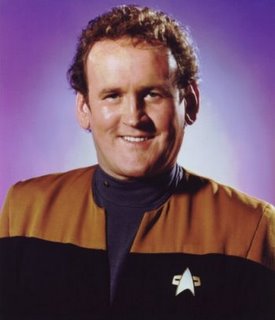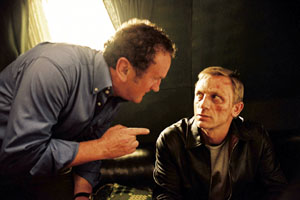
Watching the pilot for Star Trek: The Next Generation, "Encounter at Farpoint"--like the "old generation" Star Trek's first movie, a silly bit of self-satisfied business, pacing solemnly in front of the fans, stroking its Roddenberry-esque chin as it asks, "Is that all there is to God?"--I also had my first encounter with Colm Meaney, way back in 1987. He remained one of the franchise's sturdiest, most welcome sights. I was happy to see his character, Miles O'Brien, develop, even taking a quantum leap (ha, ha) to the worm-holed Deep Space Nine, where he has all kinds of opportunities to make friends and enemies, experience problems in his marriage, and generally establish himself as an old-style Star Fleet type; it was no accident, I think--or a happy one--for him to have an accent, like Scotty from the first Trek, both of them muttering in Gallic funks as they're asked to change the laws of physics on a weekly basis. Kirk would've gotten along with O'Brien better than anyone, even Bones. He could be abrupt--when it came to his mechanisms, or his politics, which were relatively conservative compared to his superiors--Picard and Sisko were enlightened, post-Klingon War types--although Sisko seemed to enjoy firing up the phasers when necessary--while O'Brien seemed to roll his eyes at their facilitator tendencies. But O'Brien could also be easy-going, amused by situations that made his peers tense. For someone living in the Star Trek world, he had surprisingly little baggage; while those around him battled inner demons and wrestled with conflicting loyalties and the finer points of the Prime Directive, Miles, sleeves often literally rolled up, whistled and worked.
Here it comes: Imagine my surprise to see him in The Snapper (1993), Stephen Frears' comedy-drama in which Meaney plays Dessie Curley, a working-class Irish Da whose twenty-year-old daughter becomes pregnant. His cold, profane, spluttering denial melts into warm, profane, spluttering acceptance in a narrative arc as filled with regrets as reconciliations. His maturing relationship with his daughter, in which forgiveness and strength combine to save them all, is set beside his rough-and-tumble marriage. As his wife informs him, "It's a terrible shock ... Being married for twenty-five years, and finding out your husband's a prick." This is not merely an observation but a goad, one of many on Kay's part, to rouse her husband to decency. But it's a comically rough road. After finding nothing to watch on TV, he turns to his wife and blandly asks, in the midst of a situation fraught with the perils of sexuality, "I suppose a ride's out of the question?" Oh, Miles!
 But for anyone who's followed Meaney's career, this is just a test-drive. After all, Dessie is at heart a decent man who just happens to be capable of being a pain, like Miles O'Brien. And then the pain takes over, in a series of revelatory turns as one variety or another of creep or ass: Agent Duncan Malloy in Con Air (1997), so insulting that we know the only reason he has a Corvette is so that we can have the satisfaction of seeing it destroyed, spectacularly; Jerry Lynch in Intermission (2003), another insufferable cop, whose self-aggrandizing ways are the cause of at least half of this movie's dizzying misfortunes; and the brutally efficient Gene in Layer Cake (2004), a survivor in the high-attrition-rate field of drugs and general gangsterism. He's played other, less ragged characters over the years, but these are the ones I've noticed the most, because they chafe so painfully against Chief Miles O'Brien.
But for anyone who's followed Meaney's career, this is just a test-drive. After all, Dessie is at heart a decent man who just happens to be capable of being a pain, like Miles O'Brien. And then the pain takes over, in a series of revelatory turns as one variety or another of creep or ass: Agent Duncan Malloy in Con Air (1997), so insulting that we know the only reason he has a Corvette is so that we can have the satisfaction of seeing it destroyed, spectacularly; Jerry Lynch in Intermission (2003), another insufferable cop, whose self-aggrandizing ways are the cause of at least half of this movie's dizzying misfortunes; and the brutally efficient Gene in Layer Cake (2004), a survivor in the high-attrition-rate field of drugs and general gangsterism. He's played other, less ragged characters over the years, but these are the ones I've noticed the most, because they chafe so painfully against Chief Miles O'Brien. This is why I welcome Meaney on the sinister side. The friction between O'Brien--ingrained into my visual imagination after all those repeated Star Trek viewings--and Meaney's select turns as scary dad, know-it-all, self-promoter, and enforcer, burns even more unsettling after-images into the bad-guy roles. Meaney is actually more interesting as a heavy because of O'Brien than despite him. I look forward to the next time he asks me to hate or fear him.
This is why I welcome Meaney on the sinister side. The friction between O'Brien--ingrained into my visual imagination after all those repeated Star Trek viewings--and Meaney's select turns as scary dad, know-it-all, self-promoter, and enforcer, burns even more unsettling after-images into the bad-guy roles. Meaney is actually more interesting as a heavy because of O'Brien than despite him. I look forward to the next time he asks me to hate or fear him.
No comments:
Post a Comment